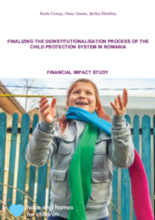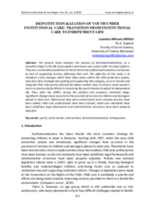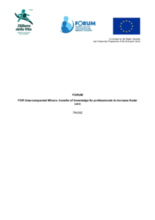Displaying 91 - 100 of 220
The current study examined longitudinal trajectories of memory and executive functioning (EF) from childhood to adolescence in the Bucharest Early Intervention Project, a randomized controlled trial of foster care for institutionally reared children in Romania.
Data and Trend Analysis (DATA) Refugees and Migrants at the Western Balkans Route Regional Overview, covering period July - September 2019, describes key trends in migrations in the region, detailing information about the number of people on the move, demography (age, sex, country of origin, etc), behavioral patterns, and routes in use - with a focus on children, particularly unaccompanied children.
This study analyzes longitudinal statistics from 18 years of Hope and Homes for Children programs in Romania to demonstrate the cost savings and ability to support a higher number of children at risk if the state were to invest money into programs that allow children to remain in a family environment, rather than be placed in institutional care.
The present study analyzes the process of deinstitutionalization in Romania, as a transition stage in the life of youngsters who leave care system after turning eighteen.
This article is written as part of the FORUM project (FOR Unaccompanied Minors: transfer of knowledge for professionals to increase foster care), an EU funded project which sought to enhance the capacity of professionals to provide quality foster care for unaccompanied migrant children, primarily through the transfer of knowledge. The article aims to contribute to this transfer of knowledge by bringing together literature which is of relevance to professionals developing or enhancing foster care services for unaccompanied migrant children.
The study examines from a comparative point of view some theoretical issues of the substantive conditions of adoption both in Romania and in the Republic of Moldova as they are regulated by the specific laws.
The aim of this study is to examine associations between signs of reactive attachment disorder (RAD) and disinhibited social engagement disorder (DSED) and social functioning in children with a history of institutional rearing in early adolescence.
This study examined disruptions in caregiving, as well as the association of these disruptions, with cognitive, behavioral, and social outcomes at age 12 in a sample of 136 Romanian children who were abandoned to institutions as infants and who experienced a range of subsequent types of care.
This study explored whether patterns of catch-up growth affect metabolic and cardiovascular outcomes in previously institutionalized adolescents in Romania.
It has long been recognized that early adversity represents a strong risk factor for the development of later psychopathology.




